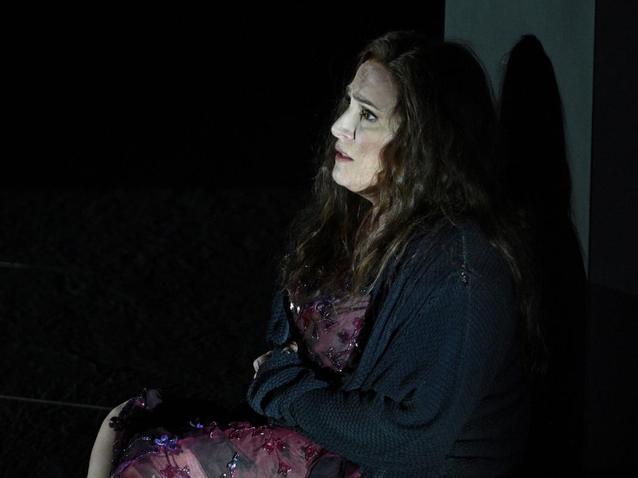 © Antoni Bofill
© Antoni Bofill
Kàtia Kabànova is an opera of a tragic, dark and terrible beauty: a woman trapped in a marriage that is unsatisfactory from all angles tries to find an exit to the vital suffocation she is feeling in the arms of a lover who is even weaker than her husband.
The feelings of guilt and, above all, a tyrant perverse and dominating mother-in-law summarising an oppressing and asphyxiating social entourage, will be make sure to make impossible any other solution but the suicide for the protagonist. The piece, which connects with Madame Bovary or even Anna Karenina, brings its originality precisely because of the omnipresent human evil embodied by the mother-in-law, who comes to be a real co-protagonist of the opera.
The production, created by David Alden for the ENO a few years ago, presents many recurring elements in his work, such as highly inclining floors that hinder the singers’ movements but symbolise the instability of the dramatic situations. It is visually severe, serious, simplified to the extreme and totally removed from the rural drama, or the realism, which are the usual contexts of this title’s productions.
This production, with scenography by Charles Edwards, escapes the monotony and the boredom as it is given life by the meaningful lighting of Adam Silverman, who makes an almost expressionist use of the characters’ shadows projected onto the walls. The frequent movement of the walls to create the different spaces required by the plot also brings variety to the staging. To serve this accurate and intelligent production we enjoyed a truly high quality cast who fully committed to the suggestions of the stage director.
Patricia Racette – who was part of the original production when it was premiered in English, naturally, at the ENO – prepared the piece again in the original Czech text to perform it in Barcelona. In all aspects, Racette was a great performer: vocally, obviously, as well as in the style, but also as an actress capable of conveying all the unbearable suffering, the desperation and the tragic dimension of the character. Next to her, Rosie Aldridge accomplished a perfect, hieratical, monolithically evil, cold and cruel mother-in-law. Michaela Selinger delivered with skill a young, alive, self-confident Varvara who escapes the oppression by fleeing to Moscow with her lover.
The weak Tikhon, incapable of facing his mother, was very well performed in all aspects by Francisco Vas. The frivolous and thoughtless Boris, who irresponsibly will unleash Kàtia’s passion, also received a good performance from Nikolai Schukoff. The depraved Dikoi was delivered with a slight barbaric excess by Aleksander Teliga. Kudriaix, the teacher, in love with Varvara, the only man who comes off well in this drama, was very correctly interpreted by Antonio Lozano. Also good were Josep-Ramon Oliver, Mireia Pintó and Marisa Martins in the minor roles.
Josep Pons, the in-house conductor of the Liceu’s Orchestra, assumed the musical direction of the performance and did so magnificently. Janáček’s very original writing for the voice emerges directly from the rhythm and melodic profile of the Czech language’s prosody to the extreme, fitting it like a glove. It is not easy to accompany it by an orchestra that needs to navigate the dissonances typical of the 20th century musical language whilst often also having to know how to expand in a lyrical élan linking directly with the late Romanticism. Pons and the orchestra managed to handle these two extremes well.
the 12 of November, 2018 | Print

Comments